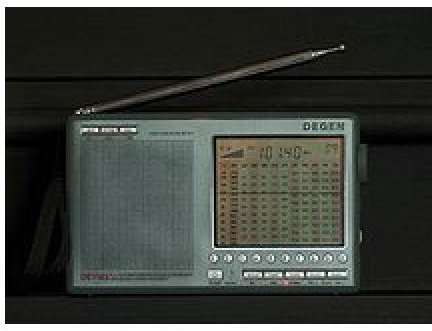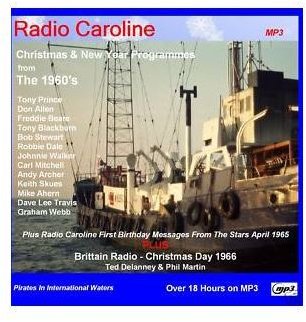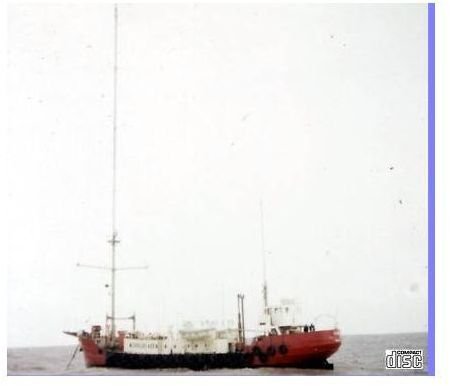Radio Caroline
Introduction to Pirate Radio Caroline - The Early Days
Radio Caroline started broadcasting on 199 meters MW, in 1964 off the North Sea coastal town of Felixstowe in Suffolk.
The station played pop music virtually nonstop, and we teenagers loved it as in those days the BBC played little pop music. We were limited to listening to Radio Luxemburg which played pop music, but only at night the most popular show being “Top Twenty” on a Sunday night, based on the top twenty highest selling records of the week.
Radio Caroline was a part of all “Sixties Teenager’s” lives, and I certainly enjoyed the music the popular bantering disc-jockeys of that period played for us.
This is an article on the early days of the Pirate Radio Station known as Radio Caroline. We begin then with the history of Radio Caroline.
The Conversion from a Ferry and First Sailing of MV Caroline
In 1964 the 700 ton ferry ‘MV Frederica’ was outfitted with all the equipment necessary to perform radio broadcasting, and then renamed MV Caroline. She was the brainchild of owner Ronan O’Rahilly, who saw the need for an independent commercial radio station that would broadcast pop music- not only from established record labels, but also from independent labels- such as his own. He got the name from a picture of JF Kennedy’s daughter Caroline, which he was much taken with on a visit to USA.
He hired popular disc jockeys who were very witty and au fair with the latest pop scene in Europe and the US. These included Johnny Walker and Tony Blackburn who are still working as DJs, but ironically now for Radio 2FM, one of Britain’s most famous stations. It has now gone digital and I am a ardent fan of listening through a DAB radio.
MV Caroline at anchor, 1966
Anyway, I diverge. MV Caroline sailed to the South East coast of Britain where she made her maiden broadcast on 199 meters MW on Easter Sunday, 1964 off Harwich.
Reference Webs:
1.radiocaroline - History
2.radiocaroline - Caroline’s founder Ronan O’Rahilly
Radio Caroline North and South
At the same time there was another ship being outfitted as a radio ship, and she was also a converted ferry, the Mi Amigo. Once ready she was renamed Radio Atlanta, and she joined MV Caroline on the south coast, broadcasting from 14 miles away. However shortly after this Radio Atlanta ran into financial difficulties and was bought by Ronan O’Rahilly, who let her stay at the present location, renaming her Radio Caroline South.
Meanwhile the MV Caroline steamed round the South coast and up the West coast, anchoring 3½ miles off Ramsey on the Isle of Man in the Irish Sea, and was renamed Radio Caroline North.
Both stations were an immediate success, broadcasting live from 6am to 6pm daily, entertaining millions of listeners.
Once established, companies were queuing up to advertise their wares on the Pirate Ships broadcasts, which brought in much needed revenue.
Reference Web: offshorechoes- history of Radio Caroline
Read on to find out the British Government’s response to the Pirate Radio Stations
British Government’s Response to Radio Caroline
The British Government had come out against commercial radio from the onset, threatening legislation to ban transmissions of Pirate Radio Stations within its territorial waters. But as elections were approaching, the government didn’t want to be seen as “kill joys” by repressing a new sound much more popular than anything the BBC could broadcast. I well remember popular music being crucified by singing harmonizing groups, as well as banjo/mandolin renditions on the BBC “Light” programme.
However once re-elected, the government started in earnest to push through legislation backed by “Acts of Parliament”’ banning commercial radio stations broadcasting even in territorial waters and encouraging companies to boycott the Pirate Stations in advertising.
The BBC all the while was promising to produce a radio station that would broadcast popular music suitable for the under 30s to take the place of commercial radio.
The government also instigated “bully-boy” tactics against the ships to delay mail, records, and food supplies to the ships, as well as to the small boats returning the crew from shore leave.
These were later put into law by the Marine Broadcasting Offences Act (1967) that made it an offence to provide supplies or advertise wares on a pirate ship. The offence carried severe penalties including a jail sentence to anyone breaking the law.
The Demise of Radio Caroline
Eventually the pressure was too much. Revenue was now non-existent, so to counteract this O’Rahilly moved Caroline’s headquarters from the UK base to Holland, hoping to catch some of the European marketing to make up for the lost UK advertising revenue.
However, although the broadcasting now was legal, tenders from Holland were coming a great distance being time consuming and much more expensive. This coupled with the music they were now forced to broadcast to raise revenue had a direct effect on the DJ’s moral and this was transmitted to their fans.
In March 1968, because of unpaid bills Radio Caroline North and South were boarded and shut down. Their anchor chains were cut and both ships were towed by Dutch Barge to Holland where they were impounded until outstanding debts were paid.
This never materialized, and so ended the early years of an era of truly outstanding pop music broadcasting enjoyed by millions of teenagers throughout Britain.
Reference Webs:
1. radiocaroline - history of Radio Caroline
Memories of Radio Caroline

We teenagers in Northern Ireland in the sixties witnessed a revolutionary swing from boring popular music broadcast by the BBC, to the new sound of Pirate Radio.
Radio Caroline came into being in the sixties when Mods and Rockers were in vogue.
Mods (short for Moderns) used to ride scooters such as Vespas and Lambrettas. These had two stroke engines and were invariably kitted out with long silk streamers, radio aerials with flags on top, and painted lavish colors such as pink. The Mods themselves wore stylish suits under long anoraks. They regarded any rocker as a deadly enemy.
Rockers were named after the rocker arms on a four-stroke motor bike engine (two stroke scooter engines didn’t have rockers), wore leather gear, and considered themselves to be cool dudes.
Both Mods and Rockers were massive fans of Radio Caroline which blasted from the new transistor radios and from the cafés they frequented.
I suppose I could have been classed as a Rocker, although in all fairness, we had little enmity with the boys on scooters, in my neck of the woods anyway.
I had a 650cc AJS which would just about hit 100mph, in a following wind and me lying flat on the tank. I hung out at a local biker’s café drinking foaming coffee from glass/Pyrex cups whilst listening to the beat of Caroline. Mods and Rockers were part of growing up with Radio Caroline, they had a lot of bad press about rival gangs fighting, but this was usually exaggerated by the press. They eventually faded out to make room for the skinheads and hippies of the late sixties.
My wife grew up in Irvine in Scotland and her recollections are similar to mine. She remembers some dancehalls broadcasting Radio Caroline before the live bands came onto the stage. Her Dad bought her a brand new Lambretta scooter and a leopard skin crash helmet, but wouldn’t let het put any “mod” gear on the scooter.
Ask anyone, man or women who was a teenager in the sixties what they remember most and they will invariably reply – Radio Caroline.

